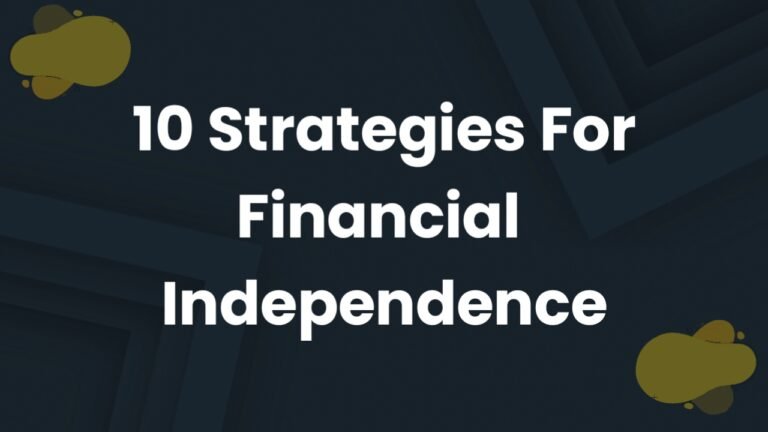Achieving financial independence is a dream many people share. It’s about having the freedom to live life on your terms without worrying about money. While it may sound challenging, financial independence is achievable with the right strategies and consistent effort. Here are ten practical strategies to help you master personal finance and pave your way to financial freedom.
1. Set Clear Financial Goals
Start by defining what financial independence means to you. Do you want to retire early, pay off all your debts, or build a comfortable emergency fund? Setting specific, measurable, and realistic goals gives you a roadmap to follow. Write your goals down and break them into smaller, actionable steps.
2. Create a Budget and Stick to It
A budget is a fundamental tool for managing your money. It helps you track your income and expenses, so you know where your money is going. Use the 50/30/20 rule as a guideline: allocate 50% of your income to needs, 30% to wants, and 20% to savings or debt repayment. Apps like Mint or YNAB can make budgeting easier.
3. Build an Emergency Fund
Life is unpredictable, and unexpected expenses can derail your finances. Aim to save three to six months’ worth of living expenses in an easily accessible account. An emergency fund acts as a financial cushion, protecting you from going into debt during tough times.
4. Pay Off Debt Strategically
Debt can be a significant obstacle to financial independence. Prioritize paying off high-interest debts first, such as credit card balances. Use the debt snowball or avalanche method to tackle your debt systematically. Once you’re debt-free, you can redirect those payments toward savings and investments.
5. Save and Invest Early
The earlier you start saving and investing, the more time your money has to grow through compound interest. Contribute to retirement accounts like a 401(k) or IRA, and consider investing in diversified portfolios, such as index funds. Even small, consistent contributions can add up over time.
6. Cut Unnecessary Expenses
Review your spending habits and identify areas where you can cut back. Do you really need multiple streaming subscriptions or daily takeout? Small changes, like cooking at home or canceling unused memberships, can save you a significant amount over time.
7. Increase Your Income
Boosting your income can accelerate your path to financial independence. Consider picking up a side hustle, freelancing, or pursuing opportunities for career advancement. Use the extra income to pay off debt, build savings, or invest for the future.
8. Educate Yourself About Personal Finance
Knowledge is power when it comes to managing money. Read books, listen to podcasts, or take online courses about personal finance and investing. The more you learn, the better equipped you’ll be to make informed financial decisions.
9. Automate Your Finances
Automation can simplify your financial life and help you stay consistent. Set up automatic transfers to your savings account, retirement fund, or investment account. Automating bill payments also ensures you’ll never miss a due date, avoiding late fees and improving your credit score.
10. Monitor and Adjust Your Financial Plan
Your financial situation and goals may change over time, so it’s important to review your plan regularly. Monitor your progress and make adjustments as needed. Celebrate milestones along the way to stay motivated and focused on your goals.
Conclusion
Mastering personal finance takes time and effort, but the rewards are well worth it. By setting clear goals, creating a budget, building savings, and investing wisely, you can achieve financial independence and enjoy greater freedom in life. Start implementing these strategies today, and watch as your financial future transforms for the better.
